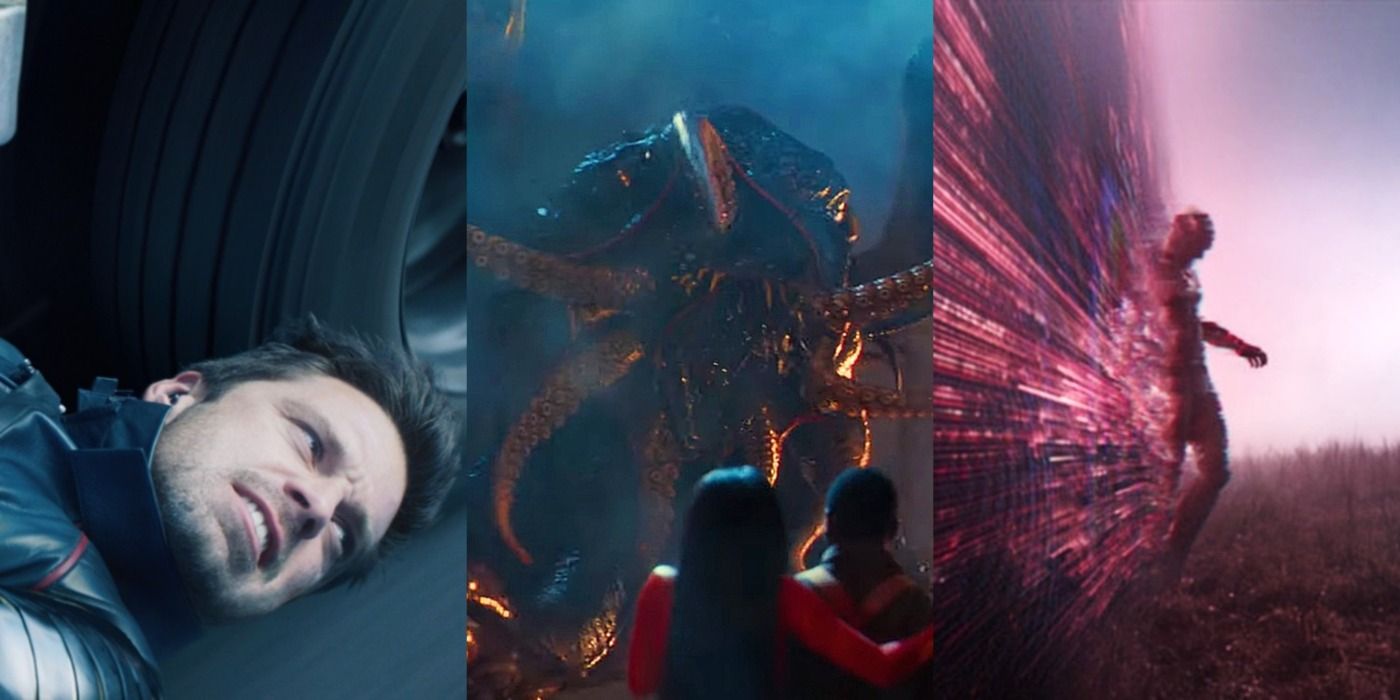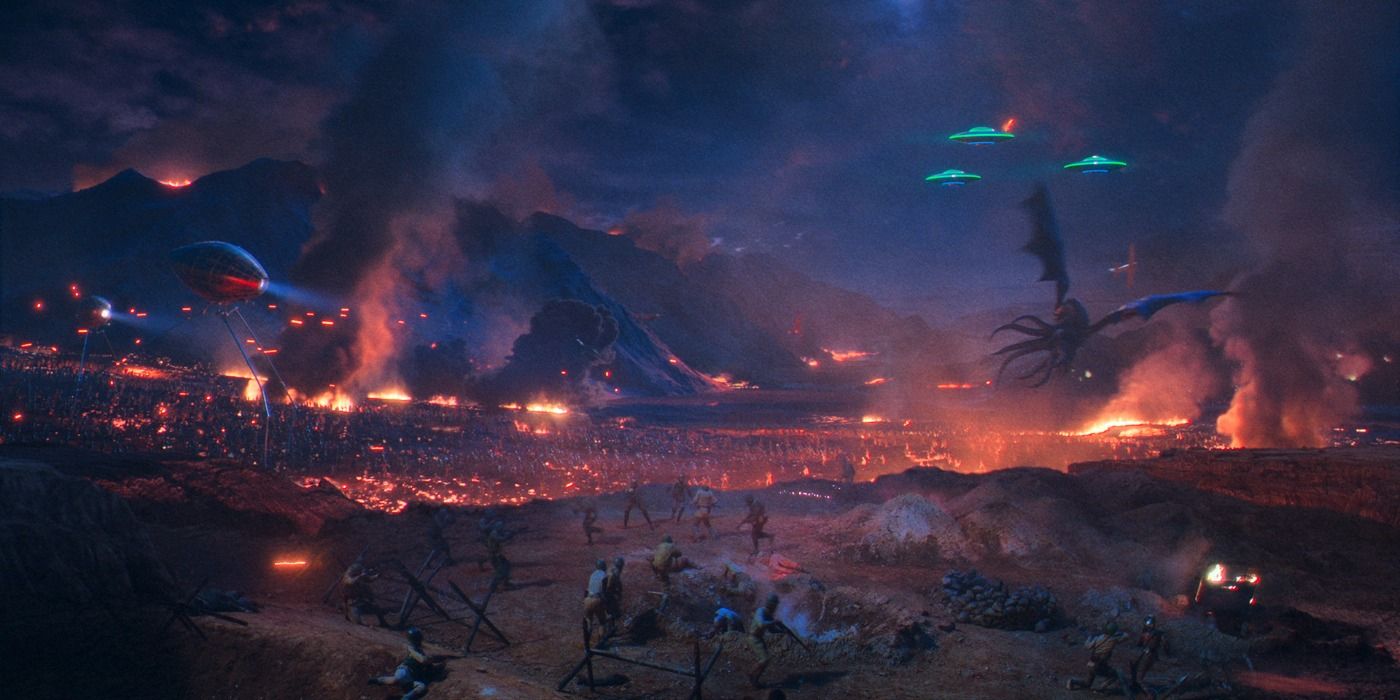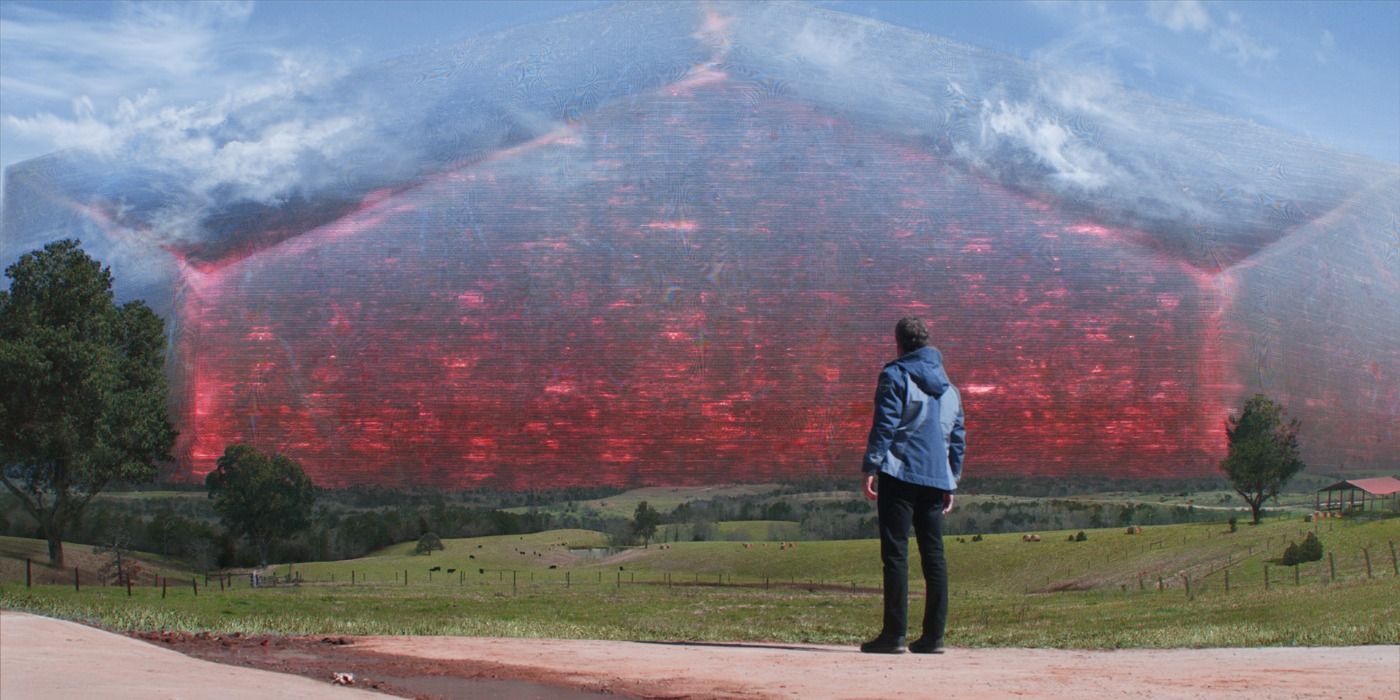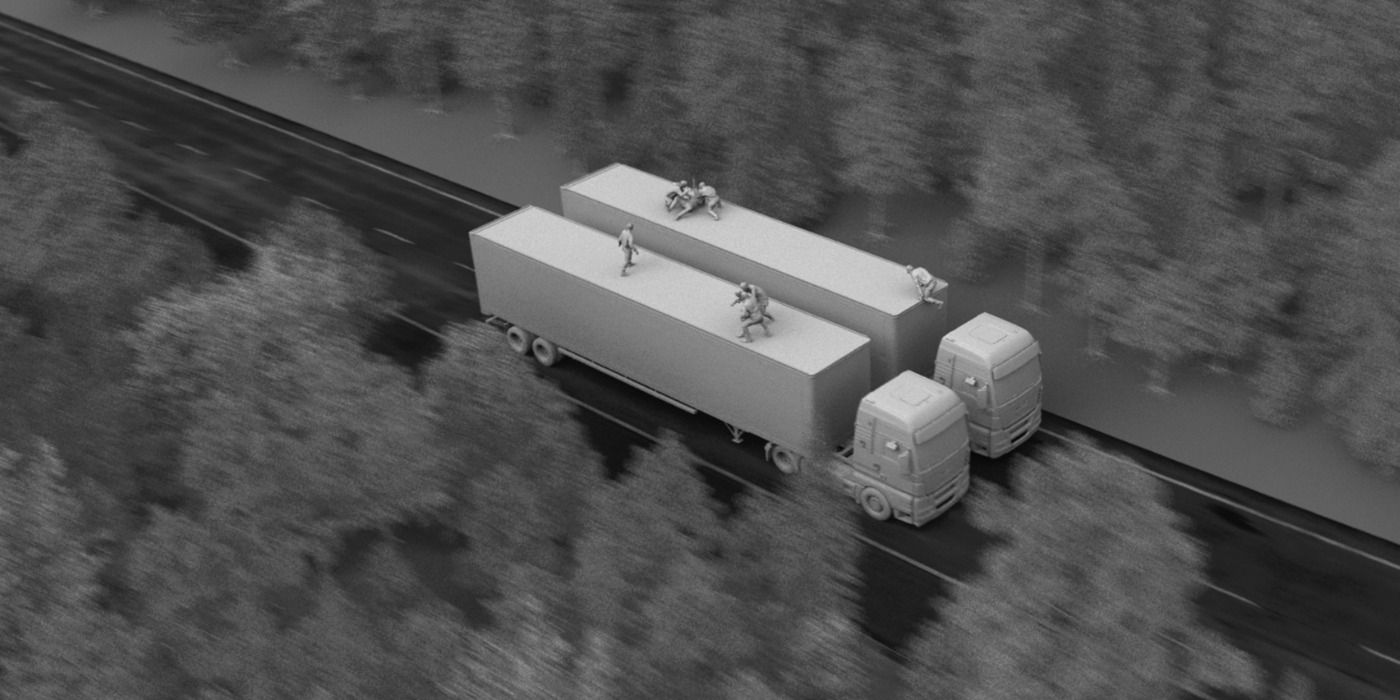
Rodeo FX's Jordan Soles celebrates the company's Emmy nominations for Falcon & Winter Soldier, Lovecraft Country, and WandaVision in an exclusive interview. 2020 was a difficult year for Hollywood, with both the film and TV industry affected by the coronavirus pandemic. It wasn't just that cinemas were closed; every stage of production was affected as well, and even VFX companies were disrupted by lockdowns and curfews.
All that makes Rodeo FX's last year particularly impressive. The visual effects company has worked with a number of high-profile networks and studios, and the quality of their work has been recognized with three visual effects nominations at this year's Creative Arts Emmy Awards. They've been nominated for The Falcon & the Winter Soldier, where they worked on a grounded action fight in the vein of Captain America: The Winter Soldier; WandaVision, where they were responsible for creating the Hex, a magical effect that became almost a character in its own right; and Lovecraft Country, where they worked with HBO on some stunning creature designs.
Three of the five VFX nominations are held by Rodeo this year, and in light of that remarkable achievement, Screen Rant spoke exclusively to Jordan Soles, Rodeo's Global Executive Vice-President.

Screen Rant: Before we get started, I just wanted to say congratulations to everybody at Rodeo on the Emmy nominations. It's brilliant to hear how well you guys are doing.
Jordan Soles: Thank you, yeah it was really exciting news, especially after the year we went through. We feel really fortunate to have been so fortunate in terms of the nominations - none of us really would have expected that, so everybody here's quite excited about it.
I'll bet! So, could you give us a little bit of background on Rodeo and the work you perform for companies like Marvel and HBO?
Jordan Soles: Sure, I mean Rodeo's been around since 2006, I've been at Rodeo since 2010. When I got here we were about 30 people, now we're trending over 600 I believe. We started off as a very matte painting and compositing company, over the course of the time that I've been here we've been adding a lot to our repertoire - sort of, learning to walk before we run in every respect, and just really focusing on the creative. When we were smaller, that was really our niche, and as we've grown it's been really important for us to maintain that idea.
For us to be able to take on Marvel shows or even an HBO show like Lovecraft Country, it's been a long journey to be able to do really complicated effects work or really complicated creature work, but at its heart, it ends up being a creative journey, and that's the part of the process that we always get excited about, it's the foot that we try to lead with every single time. I would say the Emmy nominations are probably a good example of the success we have when we lead with that foot.
So how much creative freedom would you say your teams typically have when they're working on projects like this?
Jordan Soles: Well, for Lovecraft Country we were brought in on a project like that before the project was even greenlit, and so we were helping conceive the creatures, the monsters, on that; helping to conceive some of the environments they would have to be in and interact in. We were involved very early on in that process and really helped to shape the series and a lot of what went into that series. So, in cases like that, very early on.
In the case of, like, WandaVision, we were invited into that one - there was a fair bit of concept artwork, the story was determined, but we were really attracted to - ignoring the big battles and that - was the concept of the Hex, an environment, and almost its own character, the protective environment around the world that Wanda creates. And it was always meant to be the one takeaway from the beginning was that it was a homage to TV, and so early on - even before we were awarded it, I was on Amazon and Netflix watching old episodes of Dick Van Dyke or Family Ties, and observing a lot of how things were shot, how things looked, what was through the window of the Keytons' window in their kitchen; what was the environment like? How did they set-dress all of that? What were the transitions like, what did things look like when you've have to transition in the Dick Van Dyke Show or Bewitched, or even modern things like The Office?
We just deep-dove into the idea of the parameters with which it operated and then tried to help build out a language for building into this sort of - well, environment, creature, effect, but the idea is that it's supposed to evoke TV in every respect. We quickly picked up on that the language of TV was the most important language for this show, as we were trying to build out what it would do, how it would act, how it would interact with the environment, the idea was trying to build out a language that the viewer could understand is built from the elements of TV. They should hopefully be able to recognize that, and so early on we did a lot of that, we did a lot of sharing of images of somebody watching a TV show - "Hey, this is really cool!" - I think I've got it on my phone, of images from Family Ties and Dick Van Dyke that we would just send to the supervisor and go, "This is really cool, I like this."
Kevin Feige got inspired by the HBO logo, how it comes in, and - it's little things like that, you're like, "Yeah, that's really cool." It's crazy, but when you steer somebody a little bit in that direction, then people really get excited and start really getting into it. That project really was incredibly fun to be a part of, because of the creative challenge of it - it was not well-defined, but it was well-defined in terms of what people wanted from it. It was exactly the type of thing that we love to do.

As with all Marvel projects - we'll always evolve with the world and change, as they try to make the project better and refine it, but as long as we stuck to the tenets we felt really comfortable presenting new ideas or modifications to ideas. They've kind of built an environment where the best idea wins, and that's okay and if you suddenly had a better idea of how to get something done, they were all interested in it, and were very open to it. I'd say the same thing with Lovecraft Country too - it's such a crazy show, they were okay with us presenting crazy ideas and helping to elevate it. Assuming we could get it done in time, obviously!
And even for a project like Falcon & Winter Soldier, far more grounded in terms of the world that we had to create and the battle we had to create. In every respect, it's still trying to help elevate it in some ways. And I mean, Falcon & Winter Soldier was definitely a framework that we needed to build something for TV that the audience who's only consumed the MCU in the cinema would be able to take a look at the product on the TV, and you shouldn't see a difference between the two. Those were the parameters that Marvel gave, and most of the shows that they're putting out fall into that world where it really - you should be able to go to the cinema, and you should be able to watch it on Disney+, and it shouldn't really feel like it's a vastly different world, and for a company like Rodeo - we were working concurrently on Marvel shows for Disney+ and working on Shang-Chi at the same time - and it's all the same people. It's not like, that's the cinematic pipeline and that's the TV pipeline, it was no different. We learned from our very first TV experience, Game of Thrones, that beyond the fact that its schedule is a little more constrained, expectations are always high, and as long as you're aiming as high as possible, you hopefully won't disappoint. And Marvel's expectations regardless of whether you're working on something for the theater or something for Disney+, it's the same. They have the highest expectations irrespective of the platform that it's on, and that's great. That's the bar, and they're very clear about it, you're very clear about what you need to be able to execute. But in all cases, for us, it begins with trying to think creatively about what we need to do, what ideas we can put forward, and how do we put the best product on the screen in the time that we have allotted.
All three of those projects hit during the pandemic, so those were harder things to overcome both in terms of scheduling as well as managing people during that time. But it didn't affect us too much in terms of what we were able to put out, we still feel very happy and satisfied with the work. Clearly with the Emmy nominations, it seemed to work out!
I think that's what is most impressive with these Emmy nominations; these were made under pandemic conditions. They weren't ideal circumstances, but you've done such a good job with them. How did your team work around the pandemic?
Jordan Soles: It was very hard, but basically I can tell you for example on a few of these shows - when you're really working hard, really cranking towards the end on these shows, we would have a Google Meet room all day. On Falcon & Winter Soldier, we would start the day at like 8 in the morning, we would have a room with a supervisor and a producer and all the production team, and then all the artists would jump in, and then we'd have meetings with the Marvel team over the course of the day. At that time our city was in lockdown, it was all made for HDR monitors so because I have technology I was allowed to come to the office, so I was personally doing HDR quality control checks, and we still got the remote teams working from home. So we were overcoming quite challenging technical issues that would come up, and doing it together. And of course, because we also had a curfew, I had to run home at like, ten minutes before curfew hit at 8 0'clock, I'd dash out of the office at 7.50 and we'd continue into the night in terms of doing what we could. All that to say - very challenging in terms of managing it all, just logistically speaking, but amazingly enough the creative work that was involved, and being able to bring a team together to help execute it, that worked irrespective of the fact we weren't in the office.
I think people really kind of gravitated towards that - you had built extensive community by virtue of the fact you had to build a sense of community in order to get it done. We would do it virtually when needed, and we would also find time - for a small portion of us, we had a theater that was supposed to house 60 people and we would have, like, 5 people in the theater all in different quadrants in order for us to come in and see it in a bigger format. It was really important, but even that was challenging to organize and make happen. It's funny, because you look back on it now, and even though we're still sort of in it, now it's moved into this world of normal. If I try and reverse time, back then everybody was just really nervous about everything at that time, in a very cautious and correct way. Easier to look back on, at the time it was quite challenging.

There are some experiences that it's better to experience in memory than actually go through, aren't there?
Jordan Soles: No kidding, especially people had all their kids home, it really was quite a juggle, you know?
On the subject of juggling, how does Rodeo deal with so many different workstreams that are so high-profile at the same time?
Jordan Soles: The pandemic shifted schedules in such a way that - for example, Falcon & Winter Soldier was supposed to come out before WandaVision, it was just a means of filming that prevented that flip from happening. But you can imagine the schedules were organized that way, suddenly the schedules changed and we had to make do.
We schedule things really well, we've always focused on our project management and maximizing - trying to utilize our artists as best we can, as well as giving them enough breathing room to be able to think creatively and to be able to propose new ideas. But yeah, it was harder - it was certainly hard at the beginning, as we were trying to get everything re-organized, and then at the beginning, we felt our productivity level was going to drop, it was trying to figure out how to account for a drop in productivity. In the end, I'm sure there was hidden productivity, but we never really saw it in the resulting image.
So I think we found an equilibrium that worked well, at least for us, and the fact we have as many projects as we have in allowed us to be able to shuffle things when needed because schedules were very flexible - it took a while for studios to be able to figure out editorial working remotely, and those challenges, they have an effect on visual effects. You need somebody to have been able to cut the episode correctly in order for us to be able to figure out what pieces of it that we're gonna work on, you have to have sound - I need to be able to make sure that our animation hits the sound-beats, or an explosion, something like that. We were all overcoming challenges together, but they all definitely had an effect on the timeline. As well as an impetus I'm assuming by the streaming service to actually get content out there, now they can't get things in theaters we need to put it on our streaming platform. It was an interesting juggle.
I'll just wrap up with one last question - can you give us any hints or clues as to what Rodeo's currently working on? We'll understand there may be things you're not able to say!
Jordan Soles: Gosh, we're working on a lot! The things that I can tell you for sure that are coming out - the first season of Foundation, that'll be releasing in a few weeks; we were involved in that. We're involved in the new Fantastic Beasts movie, we're involved in season 4 of Stranger Things, we're working on Gaiman's Sandman. Oh, we just delivered our last episodes of the next season of The Witcher. It's so much fun to work here because you really get a wide variety of projects that we get to work on. They just finished filming Black Adam, so that's moving on as well. It's a lot of fun, and we are very fortunate to be able to work on a lot of these projects.
It's so cool to be able to get an Emmy Award through it, but we generally speaking evaluate the project based on, what's going to help inspire our artists to create really, really interesting and cool images for the screen? That's usually how we begin, we look at the story, is it going to help motivate our artists --- it could be an action film, it could be science-fiction, it could be a superhero, or it could just be a period drama or something from the 80s, you know? It's kind of a lot of fun to be able to find this wide variety of projects for us to work on, and then we get to cast them - you get to really see what people get excited about. Over the 11 years that I've been here, it's been fascinating to see people who love a Fast & Furious movie also weirdly could love an 18th-century movie about a boat and a whale, and you would have never put the two together, but the fact they're excited or motivated, you watch that turn into the work on the screen and you see it right away.
The translation is phenomenal, and it's been fun to watch, and so we see it all the time from the very beginning of a film, when it's still words on paper, to the end result when you were able to share it with the audience. That process is so fundamentally fun to be a part of. For a company like ours - like I say, I started when we were, like, 30 people - to be a part of building something that allows a group of creatives to bring words on a page into images, and effects and creatures, it's fun. Every single day is a really interesting and exciting day at Rodeo, in the best way possible.
from ScreenRant - Feed https://ift.tt/3Ej04DB

No comments: